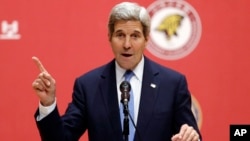Secretary of State John Kerry was clear: Either the United States signs onto a wide-ranging Pacific Rim free trade pact, or risks getting left behind in the world of global economic competition.
“If we don’t clinch free-trade agreements in the Asia Pacific it doesn’t mean that those agreements may not happen, it just means that we may not be part of them, and we may not shape them,” Kerry said.
The U.S. Senate is embroiled in a debate over the huge, 12-nation Pacific Rim trade deal, with lawmakers grappling with a multitude of national and local interests that could be affected by resulting international competition.
New Kind of Trade Deal
If finalized, the Trans-Pacific Partnership or TPP would be the largest free trade agreement in history. According to the Brookings Institution, it would impact up to one-third of all world trade and roughly 40 percent of the global gross domestic product.
Kerry described it as a historic deal.
“The TPP is not your grandparents’ trade agreement. It’s not your mom and dad’s trade agreement. It’s not even your older brother’s or sister’s trade agreement. This is a new, new entity, and ultimately this is a 21st century agreement,” Kerry said.
The deal encompasses Australia, Brunei, Canada, Chile, Japan, Malaysia, Mexico, New Zealand, Peru, Singapore, the United States, and Vietnam.
Critics of the deal include labor unions and environmental groups, who are worried that the pact will lead to a loss of jobs in the United States and an erosion of environmental standards.
Hard Times in the Absence of a Deal
Workers at a Boeing plant in the western state of Washington gathered to hear Kerry’s rebuttal of those concerns. Kerry insisted the solution was not in shutting the door to trade, but in transforming the system to make it work for everybody. He warned of harsh economic times ahead if the U.S. chose to not participate.
“The result would be boarded up windows and 'going out of business' signs in places from one end of America to another. We could see dock workers with pink slips in their hands instead of container ships steaming in and out of ports,” the secretary of state said.
“The remedy is not to pull back from trade agreements themselves, or to attempt to stop globalization, because that’s not possible,” Kerry said. “Globalization has no reverse gear.”
Simon Lester, a trade policy analyst and free trade advocate at the Cato Institute acknowledged the concern over job losses, but said on balance the United States is better off with free trade.
“It is better for consumers, it lowers prices, and even though it may cause job losses in some industries, it creates jobs in other industries as we open up foreign markets,” Lester told VOA.
Kerry also said that with the United States being part of the deal, Washington would be able to set international labor, trade and environmental standards. Without a place at the table, he said, others would determine the future and quality of international trade.





